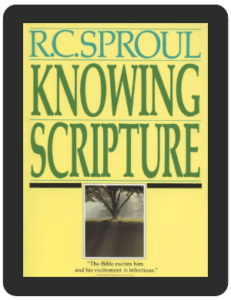Knowing Scripture
by R.C. Sproul | Book Summary
|
Author: R.C. Sproul |
This lack of consensus becomes problematic in the context of lay-led Bible studies, small group Bible studies, and in-home fellowship groups where Bible study is often reduced to discussions about personal, subjective opinions about the Bible. The obvious question in these settings is simply this: Who gets to determine what a particular Bible passage means and how it applies to our lives, and how does anyone make such a determination? "My prime motivation is to offer basic, 'common sense' guidelines to help serious readers study sacred Scripture profitably." (p. 12) These common sense guidelines include the following concepts:
Using important tools for Bible study. |
Dr. R.C. Sproul (1939 – 2017) was founder of Ligonier Ministries, a Reformed Christian organization that exists to proclaim, teach, and defend the holiness of God to millions of people around the world. He also served as founding pastor of Saint Andrew's Chapel in Sanford, Florida, the first president of Reformation Bible College, and as executive editor of Tabletalk magazine.
His radio broadcast, Renewing Your Mind, continues to air daily on hundreds of radio stations around the world and can be heard online. A prolific writer, Sproul authored more than a hundred books, including The Holiness of God, Chosen by God, Pleasing God, If There's a God Why Are There Atheists?, and others and contributed dozens of articles to national evangelical publications. Sproul was a beloved theologian and speaker, appearing at conferences, churches, colleges, and seminaries around the world. He also served as general editor of the Reformation Study Bible.
Knowing Scripture
by R.C. Sproul
[ Book Summary ]
| Author | R.C. Sproul |
| Publisher | IVP |
| Date | 1977 |
| Pages | 125 |
Overview:
"Since neo-orthodox theology called the church back to a serious study of the content of the Bible, there has been more concern in the life of the church for understanding and applying its message to our generation." (p. 11) Unfortunately, this growing desire to study the Bible has not led to a growing consensus about the most "rudimentary principles of biblical interpretation" (p. 11).
This lack of consensus becomes problematic in the context of lay-led Bible studies, small group Bible studies, and in-home fellowship groups where Bible study is often reduced to discussions about personal, subjective opinions about the Bible. The obvious question in these settings is simply this: Who gets to determine what a particular Bible passage means and how it applies to our lives, and how does anyone make such a determination?
"My prime motivation is to offer basic, 'common sense' guidelines to help serious readers study sacred Scripture profitably." (p. 12) These common sense guidelines include the following concepts:
- Understanding the inspiration of the Bible
- Respecting the authority of the Bible
- Learning the basic rules for Bible study
Using important tools for Bible study.
Dr. R.C. Sproul (1939 – 2017) was founder of Ligonier Ministries, a Reformed Christian organization that exists to proclaim, teach, and defend the holiness of God to millions of people around the world. He also served as founding pastor of Saint Andrew's Chapel in Sanford, Florida, the first president of Reformation Bible College, and as executive editor of Tabletalk magazine.
His radio broadcast, Renewing Your Mind, continues to air daily on hundreds of radio stations around the world and can be heard online. A prolific writer, Sproul authored more than a hundred books, including The Holiness of God, Chosen by God, Pleasing God, If There's a God Why Are There Atheists?, and others and contributed dozens of articles to national evangelical publications. Sproul was a beloved theologian and speaker, appearing at conferences, churches, colleges, and seminaries around the world. He also served as general editor of the Reformation Study Bible.



